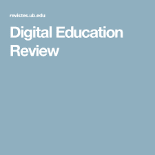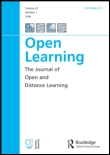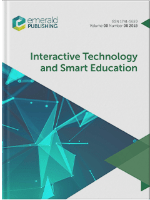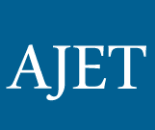
TECHNOLOGY IN SOCIETY
Scope & Guideline
Charting the Course for a Tech-Driven Future
Introduction
Aims and Scopes
- Self-Directed Learning and Agency:
A core focus of the journal is on self-directed learning, investigating how technology can facilitate learner autonomy and agency, particularly in K-12 and higher education settings. - Educational Technology Integration:
The journal consistently addresses the integration of technology in educational practices, examining various tools, methodologies, and frameworks that support effective teaching and learning. - Impact of Digital Tools on Learning Outcomes:
Research published in the journal often evaluates the effectiveness of digital tools and platforms on student engagement, learning performance, and overall educational outcomes. - Scaffolding and Support Mechanisms:
There is a significant emphasis on scaffolding strategies and support mechanisms in technology-enhanced learning environments, focusing on how these can improve learner engagement and achievement. - Equity and Accessibility in Education:
The journal addresses issues of equity and access in education, particularly in relation to the digital divide, and seeks to explore how technology can bridge these gaps. - Emerging Technologies and Trends:
It also explores the implications of emerging technologies, such as AI and VR, in educational contexts, analyzing their potential benefits and challenges.
Trending and Emerging
- Artificial Intelligence in Education:
There is a burgeoning interest in the application of AI in educational contexts, exploring how AI can support personalized learning, enhance teaching practices, and improve educational outcomes. - Gamification and Game-Based Learning:
Research on gamification and game-based learning is trending, focusing on how these strategies can promote engagement, motivation, and creativity among learners. - Multimodal and Collaborative Learning:
Emerging themes highlight the importance of multimodal approaches and collaborative learning environments, emphasizing how technology can facilitate interaction and cooperation among learners. - Mental Health and Well-Being in Learning Environments:
Increasing attention is being paid to the role of technology in supporting mental health and well-being in educational settings, particularly in the context of remote and blended learning. - Innovative Assessment Strategies:
There is a growing focus on innovative assessment methods, such as automated feedback systems and learning analytics, to better understand and improve learner performance.
Declining or Waning
- Traditional Pedagogical Models:
There is a noticeable decline in research focusing solely on traditional pedagogical models without technological integration, as the emphasis shifts towards innovative, technology-enhanced approaches. - General Technology Use without Contextualization:
Studies that merely discuss technology use without specific contextual applications in learning environments are becoming less frequent, as researchers increasingly focus on contextualized technology integration. - Focus on Basic Digital Skills Training:
Research centered around basic digital skills training is waning, giving way to more sophisticated analyses of digital literacy, critical thinking, and problem-solving in technology-rich environments. - Single Technology Evaluations:
The journal has seen a decrease in papers that evaluate the effectiveness of a single technology in isolation, as there is a growing preference for studies that examine complex interactions among multiple technologies and pedagogical strategies.
Similar Journals

Contemporary Educational Technology
Transforming Teaching with Cutting-Edge TechContemporary Educational Technology is a premier journal published by BASTAS PUBL LTD - UK, specializing in the dynamic intersection of educational practices and technological advancements. With an E-ISSN of 1309-517X, this journal serves as a vital resource for researchers, educators, and professionals keen to explore innovative solutions and methodologies in education. Ranked in the Q2 category for both Education and Management of Technology and Innovation in 2023, Contemporary Educational Technology boasts impressive Scopus ranks, standing at #187 out of 1543 in the Social Sciences Education field, reflecting its influence and contribution to contemporary research. Through its open-access approach, this journal facilitates the dissemination of knowledge, making cutting-edge research readily available to a global audience. By examining developments from 2018 through 2024, it aims to critically analyze and promote the integration of technology in educational contexts, thereby fostering improved learning outcomes and innovative teaching practices.

Digital Education Review
Innovating Practices for a Digital Learning EraDigital Education Review, published by the University of Barcelona, stands at the forefront of the Digital and Educational Technology field, offering a valuable platform for researchers, educators, and policymakers since its inception as an Open Access journal in 2010. With an emphasis on innovative practices and critical evaluations in digital education, the journal has garnered an impressive standing within the academic community, achieving rankings of Q3 in Computer Science Applications and Q2 in Education for 2023, alongside a notable position in the 71st percentile of Social Sciences - Education rank (447 out of 1543). The journal aims to foster interdisciplinary dialogue and disseminate research that influences educational transformation through digital means. Based in Spain, the Digital Education Review not only promotes high-quality research but also engages with a global audience, making it a pivotal resource for those dedicated to advancing the understanding of digital educational practices.

Journal of E-Learning and Knowledge Society
Fostering Collaboration in the E-Learning EcosystemJournal of E-Learning and Knowledge Society is a premier academic journal dedicated to the exploration and advancement of e-learning and knowledge dissemination in contemporary society. Published by the SOC ITALIANA E-LEARNING, this journal has established itself as a vital resource for researchers and practitioners since its inception in 2006. With an open access model adopted in 2007, the journal promotes the free exchange of ideas and research findings, ensuring wide accessibility to academic contributions in this rapidly evolving field. The journal is indexed in notable databases and holds a Q3 classification in both Computer Science Applications and Education, reflecting its significant role in the advancement of educational technologies. Furthermore, its Scopus ranks highlight its relevance within the educational and computer science communities. Based in Rome, Italy, the Journal of E-Learning and Knowledge Society aims to bridge the gap between theory and practice, providing a platform for innovative research that shapes the future of digital learning environments. Whether you are a researcher, educator, or student, this journal offers valuable insights and developments in e-learning that are critical to navigating today’s knowledge society.

Studies in Self-Access Learning Journal
Unlocking the potential of self-access learning worldwide.Studies in Self-Access Learning Journal is a pioneering academic outlet dedicated to the exploration and advancement of self-access learning practices across diverse educational contexts. Published by Kanda University of International Studies in Japan, this open access journal has been committed to disseminating high-quality research since its inception in 2010, facilitating global access to valuable insights in the fields of Computer Science Applications, Education, and Linguistics and Language. With a significant presence in academic databases, the journal has achieved notable rankings, including Q3 in both Computer Science Applications and Education, and Q2 in Linguistics and Language for 2023. Its emphasis on innovative practices in self-directed learning makes it an essential resource for researchers, educators, and practitioners alike, who are looking to contribute to and benefit from the latest findings in this dynamic area of study. As the journal continues to evolve through its converged years from 2019 to 2024, it remains a vital forum for scholarly dialogue, encouraging multidisciplinary collaborations and enriching the educational landscape.

International Journal of Technology in Education
Transforming Teaching with Innovative InsightsThe International Journal of Technology in Education, published by the International Society for Technology Education & Science (ISTES), serves as a vital platform for researchers, educators, and practitioners devoted to the intersection of technology and educational practices. With an E-ISSN of 2689-2758, this journal aims to showcase innovative research, case studies, and theoretical contributions that explore how emerging technologies can enhance teaching and learning. Although specific metrics like impact factor and HIndex are currently unavailable, the journal is committed to rigorous peer review and high academic standards, ensuring that all published work contributes meaningfully to the evolving landscape of educational technology. As an open-access journal, it strives to make research widely available, fostering collaboration and knowledge sharing among its audience. Whether you are a researcher exploring new horizons or a professional seeking practical applications of technology in education, the International Journal of Technology in Education is an indispensable resource.

Open Learning
Shaping Tomorrow's Learning Environments TodayOpen Learning, published by Routledge Journals, Taylor & Francis Ltd, is a leading peer-reviewed journal in the field of education and e-learning, showcasing innovative research and practice since its inception in 1970. With a robust impact factor and consistently ranked in the Q1 category for both education and e-learning by Scopus, this esteemed journal positions itself at the forefront of academic dialogue, exploring the evolving landscape of digital and open learning environments. The journal's authoritative content and empirical studies serve as essential resources for researchers, educators, and students striving to enhance pedagogical strategies and educational outcomes in a rapidly changing technological world. Published quarterly, Open Learning remains committed to cultivating scholarly exchange and advancing knowledge within the global education community.

Interactive Technology and Smart Education
Empowering learning with cutting-edge technology.Interactive Technology and Smart Education is a leading academic journal published by EMERALD GROUP PUBLISHING LTD, dedicated to exploring the dynamic intersection of technology and education. With a robust impact factor signifying its significant contributions to the field, this journal consistently ranks in the Q1 quartile in categories such as Computer Science (Miscellaneous), Education, and E-learning, reflecting its prestige and wide-ranging influence. A staple for researchers, educators, and industry professionals, the journal addresses innovative practices and developments in interactive technologies that enhance teaching and learning experiences. Operating from its base in the United Kingdom, the journal spans nearly two decades of impactful publishing, featuring high-quality research that plays a crucial role in shaping the future of education through technology. Scholars seeking to stay at the forefront of this evolving field are encouraged to contribute and engage with the journal's pioneering work.

Australasian Journal of Educational Technology
Empowering Educators with Innovative Tech InsightsAustralasian Journal of Educational Technology (AJET), a premier peer-reviewed journal published by the Australasian Society for Computers in Learning in Tertiary Education (ASCILITE), has been at the forefront of advancements in educational technology since its inception in 1985. With an impressive Q1 ranking in both Education and E-learning categories for 2023, this open access journal (ISSN: 1449-3098, E-ISSN: 1449-5554) serves as a vital platform for researchers, practitioners, and students aiming to disseminate innovative research and practices in the use of technology for teaching and learning in tertiary education. Based in Australia and accessible to a global audience, AJET is committed to enhancing educational outcomes through the integration of technology, fostering a vibrant community of scholarship and collaboration among educators and industry professionals. With its high impact ranking (Rank #105/1543 in Social Sciences - Education), AJET remains a significant contributor to the scholarly discussion on effective learning environments in an increasingly digital world.

EDUCATIONAL TECHNOLOGY & SOCIETY
Transforming Education Through Technology and InnovationEDUCATIONAL TECHNOLOGY & SOCIETY is a prestigious, peer-reviewed journal dedicated to advancing the fields of educational technology and its societal implications. Published by the International Forum on Educational Technology and Society at National Taiwan Normal University, this journal has established itself as a transformative platform for research and innovation in education, e-learning, and engineering. With a commendable impact factor reflected in its Q1 quartile rankings across multiple categories, including Education and Sociology, this journal is recognized for its rigorous scholarship and impactful contributions, ranking in the top percentiles within its respective fields. Since its transition to Open Access in 1998, EDUCATIONAL TECHNOLOGY & SOCIETY has provided an invaluable resource for researchers, educators, and policymakers, facilitating the dissemination of cutting-edge research that drives progress in educational practices globally. Whether you are a seasoned researcher or a dedicated student, this journal fosters a vibrant academic community committed to exploring innovative approaches in educational technology.

Language Learning in Higher Education
Fostering scholarly dialogue on language pedagogy.Language Learning in Higher Education is a prominent academic journal published by DE GRUYTER MOUTON, dedicated to exploring the intricate dynamics of language acquisition and pedagogical practices within the higher education context. With a robust ISSN: 2191-611X and E-ISSN: 2191-6128, this journal provides a platform for innovative research that addresses contemporary challenges and methodologies in language education. The journal enjoys a favorable reputation in the academic community, as evidenced by its ranks in the Scopus database, where it holds a position in the 67th percentile for Language and Linguistics and is classified in the Q3 and Q2 quartiles across relevant education and linguistics categories. Since its convergence in 2017, Language Learning in Higher Education aims to enrich scholarly discourse by publishing high-quality articles that foster insights into effective language learning strategies, thus serving as an essential resource for researchers, educators, and students committed to enhancing language education. The journal's editorial team is devoted to advancing the field through rigorous peer-review processes and welcomes contributions that push the boundaries of language learning research.